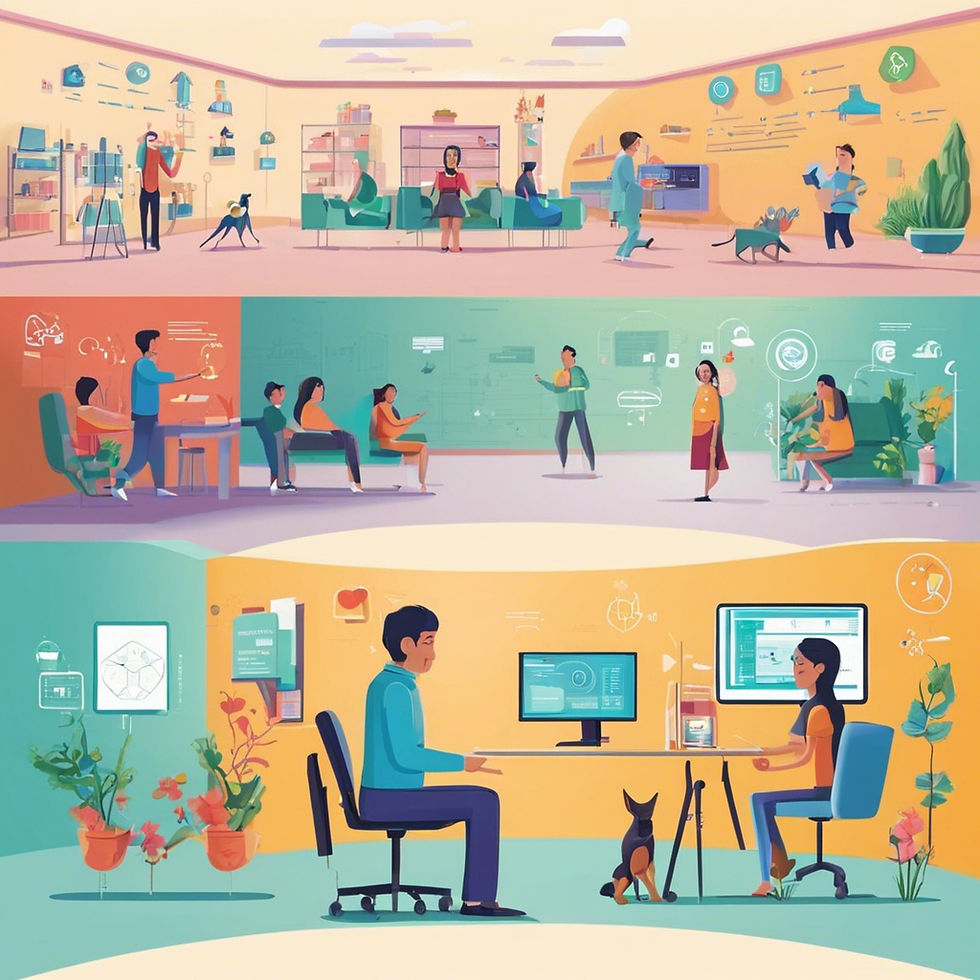Star Trek Got it All Wrong! (Sorry, Gene)
- Rod Morgan, Head of Faculty at RPM-Academy
- Nov 11, 2024
- 4 min read
Updated: Feb 1, 2025

In the world of Gene Roddenberry's Star Trek, humanity has figured out faster-than-light travel (courtesy of "warp drive"), universal translators (Vasco translator V4?), and even conquered pesky issues like disease and hunger. But the most surprising thing? Captain Kirk and his crew are still punching a clock! Sure, they’re boldly going where no one has gone before, but do we really believe that by the year 2266, humans will still be piloting starships, fixing warp drives, and handling communication channels?
Star Trek may have got a lot right—but when it comes to the future of work, they also missed the mark by about 300 years.
Picture This "Trekkies": A Starship That Doesn’t Need a Crew
Imagine it’s the 23rd century, and you’re aboard the USS Enterprise—or rather, the USS Enterprise is aboard itself. In a world where AI has evolved far beyond today’s capabilities, do we really need a crew at all? Why bother with a “helmsman” when a neural network could calculate warp speed adjustments in nanoseconds? A communications officer? Leave that to an algorithm that speaks all known languages and dialects, human or alien.

By the time we reach Star Trek’s version of the future, it’s more likely that the starship will fly, repair, and even negotiate peace treaties on its own. Kirk (apologies to Bill Shatner) may be free to kick back and practice his Shakespeare, because the days of needing human hands at the controls will be long gone. After all, if our cars can almost drive themselves today, can you imagine what our starships will be doing two centuries from now?
Humans: Still Clinging to Work Like It’s 2023
Here’s the thing: We have a hard time letting go of the idea that work defines us. We’re so used to productivity as a metric of self-worth that even in a utopian sci-fi future, we imagine people must be “doing something” to justify their existence. The truth is, our attachment to traditional jobs might be more about habit and nostalgia than necessity. And as we move deeper into the age of automation, it’s worth asking: Do we need to keep working just because we always have?
The Rise of AI and the “End” of Jobs
From piloting planes to diagnosing diseases, AI is already doing things we once thought only humans could do. And unlike us, it doesn’t need sleep, coffee, or motivational pep talks. Imagine a future where AI not only makes your job easier but replaces it entirely. It’s not hard to picture—because we’re already halfway there.

As we charge into this new frontier, the jobs that many of us take for granted may simply vanish. And rather than clinging to the roles of the past, maybe it’s time to consider an alternative future where humans aren’t tied to "working 9-to-5" (sorry, Dolly). What if the “end of jobs” is not a problem to be solved, but a leap forward for society?
So… What Do Humans Do?
With the robots and algorithms doing the heavy lifting, humanity may find itself with a whole lot of free time. But that doesn’t mean we’ll sit around twiddling our thumbs. Imagine a world where your day is no longer dictated by productivity, and where fulfillment comes from curiosity, creativity, and contribution.

In a post-work world, we might shift from labor to learning, exploring new sciences and arts without the need to turn everything into a “job.” Imagine the freedom to pursue knowledge for knowledge’s sake, to collaborate and create without worrying about paychecks. Think of it as the ultimate career shift: from employees to explorers.
But Is This Utopia or Dystopia?
Of course, not everyone would see this “jobless” world as a paradise. For some, work is tied to purpose, identity, and community. What happens when those anchors disappear? This is where Universal Basic Income (UBI) could come in, a system where survival isn’t tied to employment. It’s a bold concept, but in a world where machines and algorithms do all the “work,” maybe it’s the only way forward.
Yet, even in this idyllic future, some will argue that without jobs, we risk losing more than just our routines. Who are we without our titles and tasks? Will we be better off, or does removing work from the equation take something vital away from our humanity?
Maybe Gene Roddenberry Had It Right… Sort Of

Star Trek may have misjudged our need to work, but it got something profoundly right: our endless quest to explore, learn, and connect. In the future, we may not be “working” in the way we know it today, but we could find purpose in pushing the boundaries of knowledge and experience. And isn’t that, in some sense, the true final frontier?
So, while we won’t be staffing starships in the way Roddenberry imagined, perhaps his vision of a world driven by curiosity and a spirit of adventure is closer to the truth than we thought.
Image source: Kipp Teague, https://www.flickr.com/photos/retroweb/16935437543 (Creative Commons 2.0)
P.S. If you’re ready to dive deeper into reimagining work as we know it, check out “Lean Trek,” our very own video series on bold innovation and the power of a good paradigm shift. Because if we’re going to question everything, we might as well do it with a bit of style. Visit Lean Trek on YouTube to "boldly go" and watch the series.









Comments